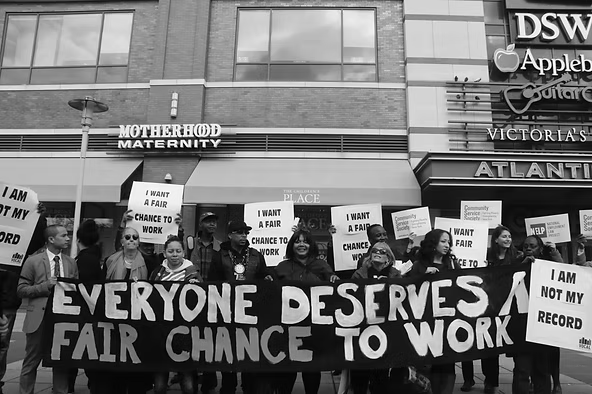
By Kevin McCracken, Co-Founder of Social Imprints
Seventy million Americans face barriers to employment because they have a criminal record. That means one in three people struggles to find a job. Employment, especially roles that offer livable wages, and education are some of the best ways to reduce recidivism rates. However, many returning citizens cannot find employers and positions that will allow them to earn a living wage. In fact, returning citizens earn about 53% of the median U.S. worker’s wage in the first few months after being released, contributing to significant lifetime earnings losses. Thus, more than 50% previously incarcerated people will return to prison at some point during their lives, deepening economic disparities. The barriers that prevent people from earning a living as returning citizens contribute to a cycle that traps people in the criminal justice system.
At a time when our country faces a continued labor shortage, stemming from the pandemic and the consequent Great Resignation, it’s clear that fair chance employment offers a solution. Fair chance employment is the act of offering employment to those with a criminal record. I know the power and potential of fair chance employment, because I have both been employed as a result of a fair or “second†chance and am now an employer who hires and trains returning citizens.
Before co-founding Social Imprints, a San Francisco-based promotional products company, I struggled with drug and alcohol addiction, which led to a criminal record. After my conviction, doors to employment and recovery, and a hope of normalcy, closed. Finding a job was a challenge, let alone one that offered liveable wages, benefits, and the possibility of supporting a family.
We, as a society, must do more to support returning citizens. This is essential to addressing America’s growing labor shortage and to rebuilding communities that have been disproportionately affected by incarceration.
Recruit for potential
Recruiting is a delicate balance between hiring for the position immediately open and hiring to grow your company in the long term. Recruiting with the mindset that skills can be taught removes barriers that exclude excellent candidates who may not appear perfect on paper. Rather than looking at who people were, see them for who they could be given the right tools and support for personal and professional growth.
As companies, the most important thing we can invest in is our employees. Make fair chance employment opportunities known to applicants. Add this information to job descriptions, company values, and mention it during interviews. At San Quentin State Prison, I work with inmates to refine resumes and improve interview skills. These people have talent, drive, and skills to offer our businesses. We must employ formerly incarcerated people for the benefit of both our companies and the communities that are currently being excluded from the chance to fully participate in our industries, economy, and society.
Normalize support
Returning to the workplace after being incarcerated poses its own unique challenges, and considering those hurdles can pave the way for a smoother transition. One of the best ways to support fair chance employees is to ask what they need and establish an open channel of communication. They may have responsibilities such as meetings with parole officers or mandated appointments with counselors or social workers. Be proactive and ask how to support them in managing these needs.
Beyond this, companies must build up professional development initiatives to assist employees in improving and learn new skills. This could take shape as extended onboarding training or employee mentorship programs that build relationships between new staff and veteran employees. Think outside the box. For example, consider allowing fair-chance staff members to meet with their parole officers at the office or during the workday. Meet people where they are to facilitate growth.
Treat them like family
Offer fair chances to employees your time, consideration, and professional expertise as a mentor to help them develop their skills and career. By prioritizing people first, we have been able to extend the average job tenure at Social Imprints to approximately eight years, far exceeding the industry norms. Demonstrating a commitment to your people builds a culture deeply rooted in respect. Doing so has allowed us to find some of the most loyal employees in the industry.
If we collectively extend new opportunities to the seventy million returning citizens in our country, we can develop a system that addresses the root causes of recidivism: underemployment and unemployment.


You must be logged in to post a comment.